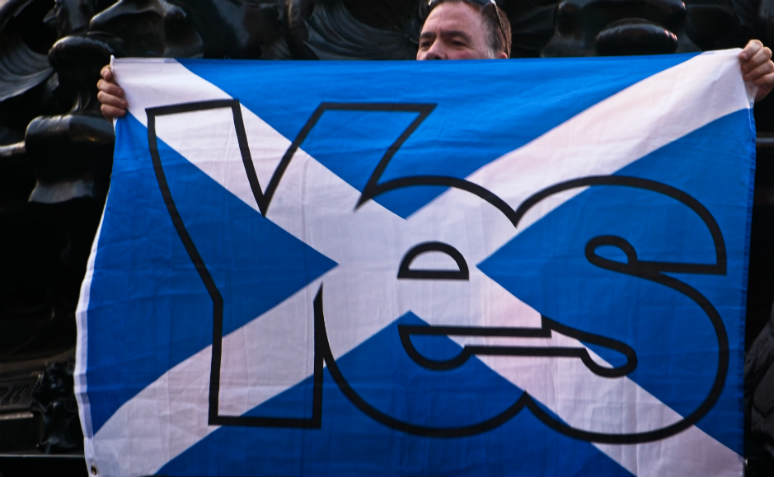 Yes to Scottish independence flag. Photo: Flickr/Garry Knight
Yes to Scottish independence flag. Photo: Flickr/Garry Knight
The SNP’s overwhelming victory in the election demonstrates the appeal for an independence referendum, but this will have to be won on the streets, argues Chris Bambery
Following the Scottish National Party’s comprehensive victory in the UK general election and Boris Johnson’s victory south of the border, that means there is one enormous issue which will dominate Scottish politics – whether Nicola Sturgeon can secure an independence referendum.
She has declared the SNP win as a further mandate for that referendum, the Scottish Parliament has already voted in favour of holding that poll, but as matters stand that must be approved by the Westminster government. Johnson has stated clearly that will not be forthcoming.
It is likely that the Scottish government will challenge that veto in the UK Supreme Court. How that will rule is anyone’s guess but strategically the radical wing of the movement urgently needs to gather for a discussion and to plan. If the referendum gets a green light then the lesson of the 2014 independence referendum was that the Radical Independence Campaign, Women for Independence, BAME self-organised groups etc. were crucial to winning support, especially in working class areas.
If Johnson retains and uses the veto then that has to be challenged outside the Courts, Holyrood and Westminster.
Here we need to draw lessons from Catalonia. In 2017 after their independence referendum, there was no plan to actually start building the Catalan Republic. True, the Catalan Parliament voted to declare independence but there was again no plan to resist the crackdown which immediately followed from Madrid.
Fast forward to the subsequent conviction of the nine Catalan leaders two months ago. In the intervening period as the pro-independence parties were semi-paralysed the social movements, particularly the cultural movement Omnium and the Catalan National Assembly, stepped into the gap. When the Spanish Supreme Court announced the convictions, the response was immediate and effective in the shape of the Democratic Tsunami: a mass movement of civil disobedience against the jailing of the nine Catalan leaders. Similar, and committed to non-violence, needs to be in place in Scotland if a referendum is vetoed by Johnson. Work must start now on that.
To return to the election and the reasons why the SNP won so big need to be grasped. Fear of a Johnson victory was key. The obvious way to topple Scottish Tories was to vote SNP. It was also clear that there was a shift to support for independence among the liberal middle class as an escape route from Johnson rule.
Interestingly among SNP activists, there was a strong desire to see Corbyn do well in England. They were not interested in Scottish Labour because of its opposition to IndyRef2. But in the final hours when Scottish Labour leader Richard Leonard said post-election Labour and SNP supporters must work together, many SNP activists I met concurred. Any campaign in Scotland from resisting austerity to supporting refugees involves many, many SNP members and activists. Not surprising given it’s a left of centre mass membership party.
During the election, there was an unfortunate tendency on the Scottish left to counterpose class politics to “nationalism”, something I thought we’d got over prior to the 2014 referendum. Support for independence then was rooted in the working class. On Election Day, I spent time with a 30-year-old guy who’d recently joined the SNP but hadn’t done anything until polling day. His support for independence is not based on nationalism but on a desire for a more democratic, pro-welfare country free of nuclear weapons. His partner backs independence and she’s from Kent.
If you look at today’s SNP, it’s heartlands are in the Central Belt from the old coalfields and steel towns, in Glasgow and Dundee and in Edinburgh in working class areas like Niddrie and Wester Hailes, and in areas like Gorgie with a large migrant population. Renewed talk of “Tartan Tories” is way off the mark and insulting.
Don’t read that as you cannot criticise the SNP and the Scottish Government but there needs to be a fraternal debate and joint work.
On both sides of the border, Labour needs to rethink regarding where it stands on Scotland. The starting point is simply to recognise Scotland’s right to self-determination by supporting removing Downing Street’s veto. For Scottish Labour, it’s hard to see a way back. Left wingers within the party need, surely, to champion independence to escape Tory rule. Above all, we need to bury the tribal bickering we saw too much in this election.
One area of work is in the trade unions. The SNP trade union group is a mass membership organisation but does not organise in the unions. This is an area where broad support for independence should and must be built.
As the majority of Scots saw that exit poll at 10 pm on election there was shock at Labour’s collapse south of the border, and deep concern over a majority Johnson government. The clear response is to quit a broken UK.

